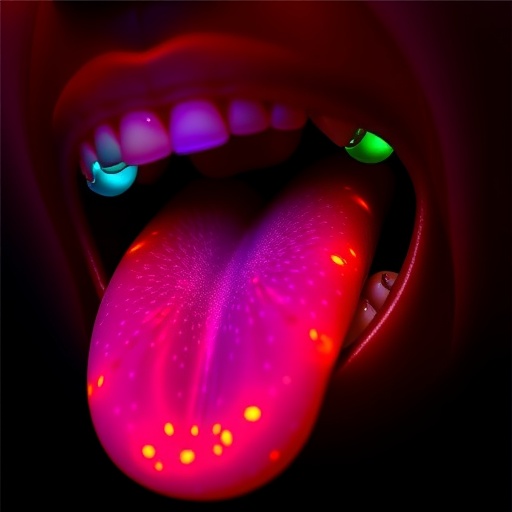In a groundbreaking study published in J Transl Med, researchers have deciphered the intricate dance between cancer therapies and specific genetic targets, particularly focusing on the role of STK19 in tongue squamous cell carcinoma (TSCC). The study, led by esteemed scientists Li, C., Peng, W., Zhong, Z., and their team, utilized advanced CRISPR/Cas9 technology to unveil the potential of combining this kinase’s modulation with the chemotherapy drug cisplatin. The implications of these findings could redefine treatment protocols for patients battling this aggressive malignancy.
The research began with an extensive library screening using the CRISPR/Cas9 system, which is renowned for its precision in gene editing. This technology allows scientists to effectively knock out genes to observe their function and assess how they contribute to cancer cell proliferation and survival. By analyzing a comprehensive pool of genetic targets, the researchers sought to identify those that, when disrupted, would enhance the sensitivity of TSCC cells to cisplatin treatment.
Cisplatin has long been a cornerstone in the treatment of various cancers, including TSCC. However, its efficacy is often limited by chemoresistance, making it imperative to identify strategies that can improve its action. The researchers hypothesized that specific genes could play a pivotal role in modulating the response to cisplatin and that their disruption might boost the drug’s antitumor effects.
Among the plethora of genes screened, STK19 emerged as a critical player. It is a serine/threonine kinase involved in several cellular processes, including those linked to cell proliferation, apoptosis, and migration. The findings revealed that silencing STK19 not only heightened the susceptibility of TSCC cells to cisplatin but also contributed to enhanced apoptosis—an essential mechanism of action for effective cancer treatment.
Further in vitro experiments corroborated these findings, demonstrating that TSCC cells with STK19 knocked out showed decreased viability and increased cell death when exposed to cisplatin. The kinase appears to modulate the cancer cells’ survival signaling pathways, potentially regulating mechanisms that confer resistance to chemotherapy. Understanding these interactions is crucial for delineating how TSCC can develop resilience against commonly used treatments.
Encouraged by the in vitro results, the researchers extended their investigation into in vivo models of TSCC. The implications of combining STK19 silencing with cisplatin treatment were further evaluated in a xenograft model. These animal studies are vital for translating laboratory results into therapeutic strategies that might be applicable to humans. Preliminary data from these experiments indicated a significant reduction in tumor size when STK19 was downregulated during cisplatin treatment.
To understand the underlying molecular mechanisms involved, the researchers performed extensive analyses on signaling pathways activated in STK19-deleted cells treated with cisplatin. Their findings suggested that the inhibition of STK19 enhances the activation of apoptotic markers while downregulating survival pathways, creating an environment conducive to increased cancer cell death.
In addition to the promise that STK19 offers in combination with cisplatin, this study underscores the potential of CRISPR/Cas9 as a powerful tool for drug discovery and cancer therapy optimization. As researchers continue to probe the genetic underpinnings of cancer biology using this technology, they are likely to uncover additional targets that may show similar synergistic effects with existing therapies.
The implications of these findings extend beyond merely enhancing the efficacy of cisplatin. They pave the way for personalized medicine approaches where the unique genetic profile of a patient’s tumor could dictate tailored combinatorial therapies. Particularly in the case of TSCC, where treatment outcomes can vary markedly, a genetic approach could facilitate the development of strategies that are both effective and targeted.
As researchers gather more data, the hope is to conduct clinical trials to evaluate the safety and effectiveness of this combined therapy in humans. The transition from laboratory discoveries to clinical application is a critical juncture that examines not only the scientific underpinnings of the findings but also their feasibility within the complex landscape of personalized cancer treatment.
In summary, the research by Li, C., Peng, W., Zhong, Z., and collaborators spotlights STK19 as a promising target in the fight against TSCC, particularly in enhancing the effects of cisplatin. As our understanding of cancer biology continues to evolve, studies such as this one encourage a re-examination of existing therapeutic regimens, pushing the frontiers of precision medicine. With continued exploration, the synergistic approach towards cancer treatment illuminated by this research could offer new hope for patients facing difficult prognoses.
More than just a story of scientific inquiry, the journey of this research encapsulates a larger narrative of innovation, collaboration, and the relentless pursuit of knowledge in the face of complex health challenges. The potential for improved outcomes in cancer treatment is a testament to the power of modern genetics and the innovative spirit driving this frontline of oncology.
As we move forward into a new era of cancer treatment that embraces both genetic insights and advanced therapeutic strategies, researchers stand at the threshold of revolutionizing treatment paradigms. For patients, the promise lies in a future where therapies are not just administered based on traditional methods, but instead become customizable experiences based on individual biomarkers and genetic profiles.
With the ultimate goal of not just prolonging life but also enhancing the quality of life, studies like this remind us that the fight against cancer is multifaceted, requiring a harmonious blend of empirical research, cutting-edge technology, and patient-centered care.
As this narrative unfolds, the journey continues, fostering hope through scientific advancements that may one day lead to curative treatments for those grappling with the harsh realities of cancer.
Subject of Research: The synergistic antitumor effects of STK19 and cisplatin on tongue squamous cell carcinoma
Article Title: CRISPR/Cas9 library screening reveals that STK19 has synergistic antitumor effects when combined with cisplatin on tongue squamous cell carcinoma
Article References:
Li, C., Peng, W., Zhong, Z. et al. CRISPR/Cas9 library screening reveals that STK19 has synergistic antitumor effects when combined with cisplatin on tongue squamous cell carcinoma.
J Transl Med 23, 1142 (2025). https://doi.org/10.1186/s12967-025-07156-0
Image Credits: AI Generated
DOI: 10.1186/s12967-025-07156-0
Keywords: CRISPR/Cas9, STK19, tongue squamous cell carcinoma, cisplatin, cancer therapy, synergistic effects




